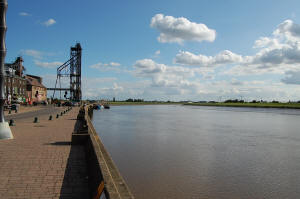|
|
|
|
The River Great Ouse
|
| The Great Ouse river rises in Northamptonshire and
then flows northwards - finally entering the North Sea
at the Wash, close to King's
Lynn. North of Cambridge, it merges with the River
Cam and then, shortly after, is joined by the
River Little Ouse
at Brandon Creek; it is at this point that the Great Ouse flows into Norfolk.
The river then flows through the heart of the Norfolk
Fens.

River Great Ouse at
King's Lynn
Historically, the river was a major navigation route
in East Anglia - one that was recognised by Daniel Defoe
in his A Tour Through the Whole Island of Great
Britain.
At Earith in Cambridgeshire the Great Ouse splits as it crosses the fens.
Two man-made channels - the
New Bedford River and the Old Bedford River - head
north-east towards King's Lynn while the Ouse or Old
West River heads eastwards and the north again to Ely. The
two Bedford rivers were the result of drainage work carried out by the Dutchman
Cornelius Vermuyden in the 17th Century - under the
instruction of the Earl of Bedford. These helped to
carry water more quickly to the North Sea and
thereby contributed hugely to draining of the fens. At the time there was considerable opposition
to this drainage work as it endangered the livelihood of
fishermen and wild-fowlers. In the anonymous poem
Powte's
Complaint (a 'powte' being a sea-lamprey) - this
opposition finds a voice.
The river plays a major part in Graham Swift's novel
Waterland - as it is where Dick Crick (Tom's
brother) worked on a dredging boat and also the place
where he finally commits suicide. In the novel, the
fictional River Leem - where Tom Crick lives with his
father in a lock-keeper's cottage - flows into the Great
Ouse.
The poet George MacBeth lived at
Wiggenhall St. Mary
Magdalen for a number of years and Dorothy L. Sayers set
her mystery novel The Nine Tailors in the fenland
around Upwell. The poet, Ada
Cambridge, who later emigrated to Australia and found
fame there as a writer grew up at
Wiggenhall St.
Germans.
In his swimmer's journey through Britain -
Waterlog (1999) - Roger Deakin swam in the Great
Ouse near Denver Sluice:
|
| 'Just downstream
from Denver Sluice, a gigantic arrangement of lock gates
that controls the main outlet of the Fen river system, I
swam the Great Ouse, which runs out to the sea at King's
Lynn. The river here is a hundred yards wide, and I
crossed its deep, thick brown waters glancing nervously
at an armada of swans bearing down on me from the
massive green, steel hulk of Denver Sluice. I felt the
depth and power of the river under me, and imagined it
must feel something like this to swim the Ganges. The
water was grained with silt, like an old photograph.' |
After Downham Market
the river flows on towards the historic town of King's
Lynn. By this stage it is a huge expanse of water,
providing deep-water passage for boats. Defoe had this
to say about Lynn and its strategic location:
|
| 'It stands on more ground than the town of Yarmouth, and
has I think parishes, yet I cannot allow that it has
more people than Yarmouth, if so many. It is a beautiful
well built, and well situated town, at the mouth of the
River Ouse, and has this particular attending it, which
gives it a vast advantage in trade; namely, that there
is the greatest extent of inland navigation here, of any
port in England, London excepted. The reason whereof is
this, that there are more navigable rivers empty
themselves here into the sea, including the Washes which
are branches of the same port, than at any other mouth
of waters in England, except the Thames and the Humber.' |
King's Lynn is definitely one of Norfolk's best-kept
secrets and well worth a visit.
Links:
More Great Ouse Photographs
|
|
|
|

